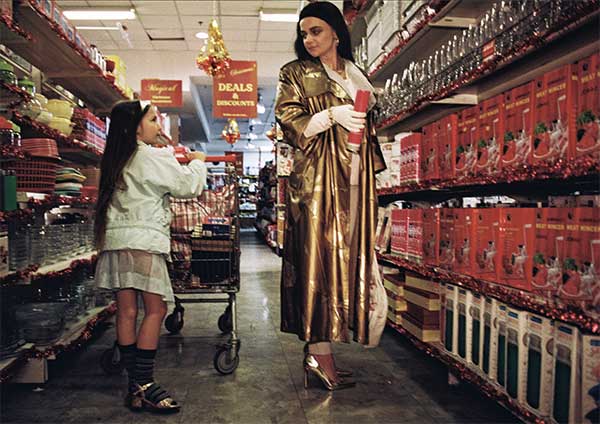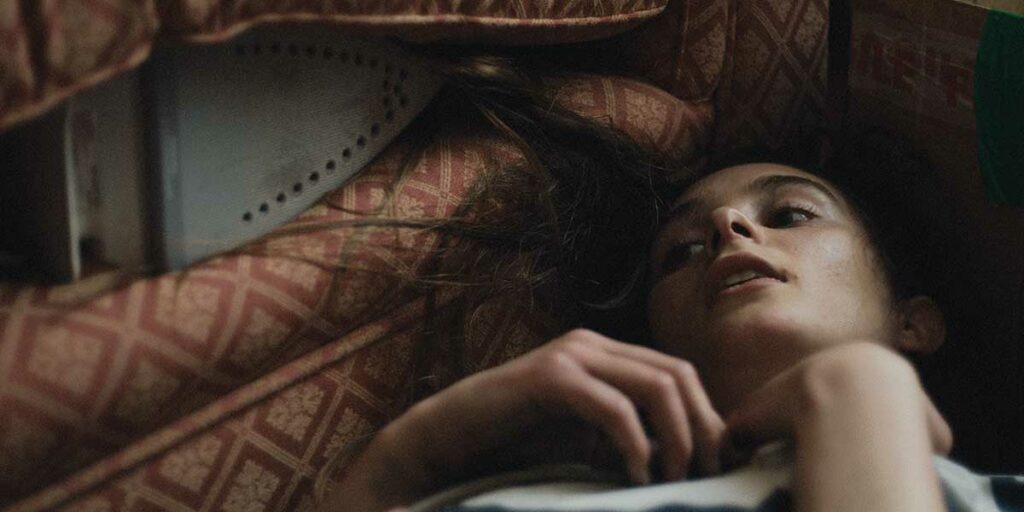In Luna Carmoon’s Hoard, a teenager comes to terms with the abuse and love she experienced as a child, and ultimately discovers who she is when the two things are combined.
Director: Luna Carmoon
Genre: Drama
Run Time: 126′
UK & Irish Release: May 17, 2024
US Release: September 6, 2024
Where to watch: in select theaters (US); on digital & VOD (UK/EIRE)
“I murdered my mother, you see. Our very own catalogue of love killed her.” Writer-director Luna Carmoon’s film Hoard begins with a sentence that perfectly introduces us to the film’s protagonist, and the bond she shared with her mother as a child. It’s a bond that still lingers, in a way, finding its way into her teenage life through the familiar “scents” that defined her childhood — a childhood marked by trauma, but also by love.
When we first meet Maria (Lily-Beau Leach), it’s 1984. It’s nighttime, and she’s sitting in a shopping trolley as her mum, Cynthia (Hayley Squires, of Beau is Afraid), rummages through a garbage bin, looking for items to bring home, sporting a studded baseball hat and a cheap fur coat. Are Maria and Cyntha homeless? As soon as the question comes to mind, we find the girl at school, where her teacher reprimands her for being sleepy, and follow her as she walks back home. But what she calls “home” looks more like an indoor landfill, containing so much stuff — from actual garbage to all sorts of objects cluttered together — that even opening the door and getting through the entrance is a struggle, as there’s just so much paper blocking it.
But Maria isn’t fazed by any of this, as she’s grown so accustomed to that lifestyle that she barely even notices it. Playing with rats, having her things disappear under piles of other stuff, finding the occasional dead animal or unpleasant smell, and even accidentally hurting herself while tripping over some of their belongings: not only is it all normal to her, but it’s comforting and reassuring, like every home should be. But we know better. At first, we wonder if Cynthia and Maria are squatting in someone else’s house, as it all looks so uncomfortable and unhygienic. But we are proven wrong when we take a closer look at their daily routine and immediately come to realise why the film is called Hoard.
And it’s not as if Maria doesn’t know that there’s something wrong with the way they live. “Other people’s houses don’t look like this,” she once tells Cynthia, asking for “a mum who irons my clothes all the time” and eventually admitting the truth: “I’m ashamed of us. I hate what we are.” But it’s also not the entire truth, as she also loves the very authentic, special bond the two of them share, despite it all.
It’s hard to be on the receiving end of a kind of abuse that follows you everywhere, dictating your every action to the extent that you’re not even allowed to lash out, as it will only bring more abuse. And it’s even harder to find a semblance of balance when Cyntha’s mood swings are so extreme, and carefree moments suddenly become scary. “…And when its time for bed, I’ll talk and talk until you wish you were dead,” Cynthia chants to her daughter, as they joke around before falling asleep, and play and abuse become one. Happiness and fear blend into a complex emotion that Maria can’t quite define — a kind of love that is also fear, disgust, and guilt, with a pinch of self-hatred. But there is also love, in a weird way that only the two of them can understand.

We begin to wonder if behind Cynthia’s uncontrolled hoarding is something more serious, like schizophrenia, but we don’t get to find out, as a series of events lead mother and daughter to be separated — the former in a hospital and the latter with a lady named Michelle (Samantha Spiro, of Sex Education), who “looks like children like [herself] when their mums need a little break”.
The next time we see Maria (Saura Lightfoot Leon), it’s 1994, and she still lives with Michelle, whom she now calls “mum”. It’s her last day of high school, she’s hanging out with her best friend Laraib (Deba Hekmat), and she looks just like any other teenager. But the trauma of her past is still there, buried deep under memories that come in “waves,” and it takes a stranger named Michael (Joseph Quinn, of Stranger Things 4) — a former foster child of Michelle’s who stays with them for a few weeks — to make them resurface.
And so, Maria embarks on a mission to reclaim her past, and quickly unravels as all these buried emotions come back, affecting her every interaction and even her own sanity, as she tries to combine two very separate aspects of her life into a self-aware whole.
What happens next is best left unspoiled, but Hoard is absolutely not the film you’d expect it to be. As you watch the movie, you’ll find yourself going through a series of contrasting emotions: you’ll laugh at its irony and absurdity, you’ll be charmed by what would seem to be the beginning of a love story, and you’ll find most of Maria’s interactions with Michelle, Laraib, and Michael incredibly rewarding, especially as you know what her childhood looked like. But there are also several highly disturbing, even disgusting scenes, and others that are simply plain weird. But that’s exactly what it’s like to be in the mind of our protagonist, and Carmoon succeeds at blending so many moods and tones where others would have failed because of the sheer humanity of her screenplay.
The most surreal scenes come from Maria’s everchanging relationship with Michael, a 30-year-old man whom we only truly get to know at the very end, in a film that plays out in real time and fully immerses us in its protagonist’s universe from start to end. And it’s a world that works by its own rules, brilliantly brought to life by effective sound design (Steve Single) that makes us feel her emotions at all times, and stunning cinematography (Nanu Segal) that imbues this one-of-a-kind film with even more personality.
The entire cast shines, but the standout is newcomer Saura Lightfoot Leon, who fully embraces the many contrasting sides of her character to bring us a complex, multilayered human that we can always relate to even if we’ve never experienced that kind of trauma.
Carmoon’s screenplay is poetic, ironic, highly metaphorical and yet boldly unsentimental. The writer-director cleverly gives us just as much information as we need to discover her characters on our own, and these meaningful details are scattered throughout the movie, from the poignant scene of young Maria touching a skeleton’s womb at school to the most matter-of-fact exchanges between adult Maria and Michael, the “loudest” of which unfold with no dialogue at all.
Speaking of Michael, Joseph Quinn excels in a role that he was born to play, conveying all the contradictions of a character who carries his own share of trauma. That trauma can be perceived in the cracks of his carefully constructed façade, that become more and more apparent as the movie comes to an end.
Hoard is jam-packed with themes, from abuse, identity, and motherhood to the kind of desperate, self-destructive grief that makes you want to fully absorb and embody the person you lost in any way you can, even if, deep down, becoming them is also your deepest fear. The film is ultimately about recognising abuse but not letting it prevent you from remembering the good, and becoming your own person as you face and overcome that trauma.
“When babies lay on their mother’s chest, no matter what age, their heartbeats will sync up,” someone tells Maria halfway through the film. With these words, Carmoon shows us that the scars left by neglect and abuse will never really leave us, and invites us to do better. Once in a while, you start watching a film and you’re immediately drawn into its world, even if you don’t fully understand it, as you know that it’s unlike anything you’ve seen before. Carmoon’s confident, unapologetically original feature debut is a must-watch at the 2023 Venice Film Festival, and I can’t wait to find out what she’ll do next.
Hoard premiered at the 2023 Venice Film Festival on September 2, 2023 and was released in cinemas in the UK & Ireland on May 17, 2024. The film is now available to watch on digital and on demand in the UK & Ireland and select countries and will be released in select US theaters on September 6, 2024.
Read our interview with Luna Carmoon, Saura Lightfoot Leon & Joseph Quinn on Hoard!

